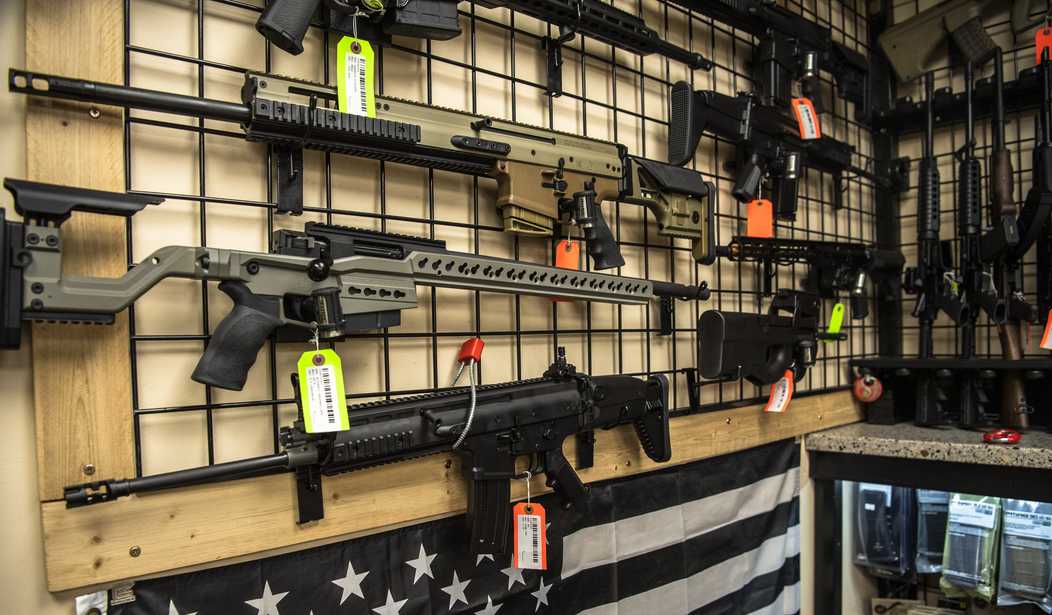Gun control activists are thrilled that a federal appeals court has allowed the government of Mexico's lawsuit against several major U.S. gun makers to proceed, at least for the time being, because they're hoping that the litigation will lead to the obliteration of the firearms industry.
A new op-ed in Newsweek from Jonathan Lowy, head of Global Action Against Violence, makes that clear. Lowy, who was formerly the general counsel and vice president of Brady's legal team, is the architect of Mexico's lawsuit, though you have scroll all the way to the bottom of his op-ed to discover his role in the litigation.
From the outset of his piece, however, Lowy makes his hopes for the lawsuit clear: a way to impose all kinds of new gun control restrictions without a vote in Congress or even unconstitutional executive actions by Joe Biden.
U.S. gun laws are broken. Even when states muster the political will to enact reasonable restrictions, for example as California did recently, they get blocked in federal court. With federal and state action on guns stymied, the gun violence epidemic can seem hopeless.
But now there's finally some hope, and it's coming from outside the United States. A federal appeals court just issued the most significant opinion ever to go against the gun industry, ruling that Mexico has the right to sue manufacturers to hold them accountable for gun trafficking and gun violence.
It's always amusing to me when anti-gunners like Lowy use the phrase "reasonable restriction", which implies there's some gun control law that he would find unreasonable. I've been covering Lowy's anti-2A efforts for two decades now, and I can't recall him ever concluding that a gun control bill goes too far. Lowy has described the Heller decision as a "radical expansion of prior precedent limiting the Second Amendment to well-regulated militias—that is, today’s National Guard", and warned ahead of the Bruen decision that striking down "may issue" licensing regimes "would have stark—and deadly—consequences in the real world"; a prediction not borne out by reality.
Lowy's hope, in other words, isn't that the courts will decide that gun makers and sellers have to jump through additional hoops before they can lawfully transfer a firearm. He's aiming for the eradication of the firearms industry, and he's using Mexico's unwillingness to confront cartel violence head-on to do it, even as he promises that gun owners wouldn't feel any impact if the courts ultimately accept his arguments.
Mexico has done what the U.S. failed to do: bring an effective lawsuit that could change the way guns are sold in this country and trafficked to others. It's part of a promising new movement, led by my organization, Global Action on Gun Violence, to bring international pressure on the U.S. gun industry and policymakers to crack down on the illegal gun market like the rest of the world does. While the U.S. has abundantly demonstrated it can't or won't take effective action on guns, international actors, unconstrained by our gun-friendly politics, can and will.
The resulting reforms will not prevent law-abiding people from buying guns, but they will stop the supply of guns to straw buyers, traffickers, and other criminals. The U.S. stands to benefit as much or more than Mexico.
All you have to do is read Mexico's intial complaint, which Lowy helped to create, to know what a lie that is. The lawsuit takes aim at everything from gun shows to private sales, along with alleging that gun companies are "designing and marketing their rifles as military-style assault weapons". Mexico (and Lowy) are demanding the courts require gun makers and sellers to, among other things; "create and implement standards sufficient to reasonably monitor and discipline their distribution systems" (which would almost certainly include "universal" background checks and gun registration schemes), "incorporate all reasonably available safety mechanisms into their guns, including devices to prevent use of those guns by unauthorized users" (hello "smart gun" mandate), and cough up $10 billion to the Mexican government in damages.
According to Everytown, the firearms industry's annual revenue is about $9 billion, so you can imagine what kind of impact a $10 billion judgement would have on the industry, or at least the manufacturers named in the complaint, who are taking their appeal of the First Circuit's decision allowing the lawsuit to move forward to the Supreme Court.
It's at least worth mentioning that Sig Sauer, one of the biggest gun companies in the U.S. wasn't named as a defendant in Mexico's lawsuit, perhaps because the Mexican government has contracts to purchase hundreds of millions of dollars worth of its products for the Marines and Navy. As The Intercept reported just a few months after Mexico's lawsuit was filed in 2021:
THE BIDEN ADMINISTRATION is pressing forward with the sale of millions of dollars in weapons to specialized elements of the Mexican military despite growing concern from lawmakers over the recipients’ abhorrent human rights records.
If completed, Sig Sauer, a New Hampshire-based company, would sell more than $5 million worth of assault rifles and suppressors to Mexico’s navy and marines. Long considered by U.S. officials to be Washington’s most trustworthy ally in the war on drugs, the Mexican navy, particularly its elite marine special operations teams, has been linked to a string of kidnappings and extrajudicial killings in recent years.
...
The relationship between the State Department, Sig Sauer, and the Mexican navy — and by extension the Mexican marines — long predates the sale in question today and is in fact part of a multiyear exchange of guns and cash.
In 2015, the State Department approved a license for Sig Sauer to export $265 million worth of assembly kits for semi-automatic pistols and submachine guns to the Mexican navy through 2024. By 2018, as human rights abuses by the marines began picking up coverage, $26.7 million in gun parts and $4.3 million in complete guns had already been exported through the deal.
“This means that Sig Sauer has at least $234 million left in sales to make before its license expires in 2024,” a reportOpens in a new tab published by Lindsay-Poland and colleagues at the Mexican Commission for the Defense and Promotion of Human Rights noted at the time. “If the license is completely fulfilled, the navy’s weapons purchases from Sig Sauer alone would nearly double the already elevated U.S. exports of guns and gun parts to Mexico.”
Is that why Mexico left Sig Sauer off its lawsuit against almost every other major manufacturer? Sure seems like it to me. After all, bankrupting a company before they've completed delivery of hundreds of millions of dollars worth of small arms would be a bad business deal for the Mexican government. Better to let them slide, at least until the contract has been completed and the Mexican military units accused of gross human rights abuses have their guns in hand. I'm sure Lowy would be happy to help them draft another lawsuit aimed at Sig and any other gun makers not named in the first round of litigation once Mexico has all of the guns it's ordered. After all, it's not really lawbreakers in Mexico that Lowy's trying to disarm. He's aiming at lawful gun owners here in the United States, and Mexico's lawsuit is just a backdoor route to prevent us from exercising our right to keep and bear arms.









Join the conversation as a VIP Member